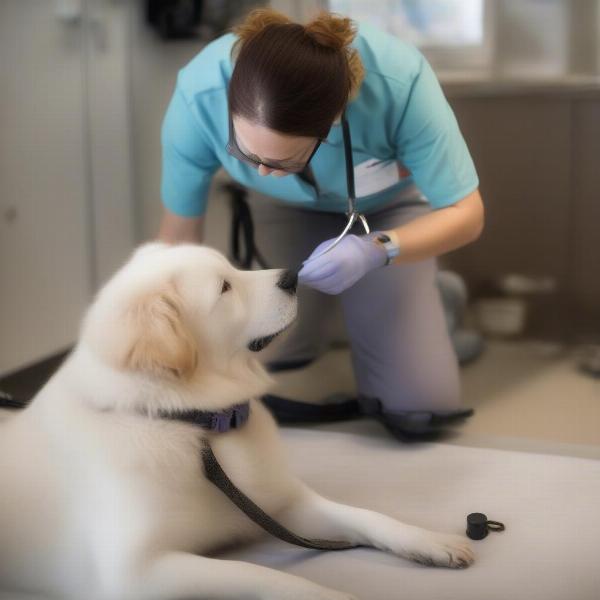The Bioflow magnetic dog collar has gained popularity among pet owners seeking alternative therapies for their canine companions. But what exactly is it, and does it really work? This comprehensive guide will delve into the science (or lack thereof) behind magnetic therapy for dogs, explore the potential benefits and drawbacks of using a Bioflow collar, and help you make an informed decision about whether it’s right for your furry friend. bioflow dog collar
Magnetic therapy has been used for centuries in various forms to treat a range of ailments in humans, and more recently, in animals. Proponents claim that magnets can influence the body’s natural energy fields, promoting healing and pain relief. However, scientific evidence supporting these claims remains limited and often inconclusive. Specifically, when it comes to Bioflow magnetic dog collars, rigorous, peer-reviewed studies demonstrating significant therapeutic effects are lacking.
Understanding Bioflow Magnetic Dog Collars
Bioflow collars utilize static magnets embedded within a comfortable, durable band. The company claims their patented Central Reverse Polarity (CRP) technology creates a magnetic field that interacts with the body’s natural processes to improve circulation, reduce inflammation, and alleviate pain. While the concept may sound appealing, it’s crucial to approach these claims with a healthy dose of skepticism.
Potential Benefits: What Do Owners Report?
Despite the lack of robust scientific evidence, many dog owners report positive experiences with Bioflow collars. Anecdotal evidence suggests these collars may help with:
- Osteoarthritis: Some owners claim their dogs experience improved mobility and reduced stiffness after wearing a Bioflow collar.
- Hip Dysplasia: Similar to osteoarthritis, some owners report less pain and discomfort in dogs with hip dysplasia.
- Post-Surgical Recovery: Anecdotal reports suggest Bioflow collars may aid in pain management and promote faster healing after surgery.
It’s important to note that these are anecdotal reports and not necessarily indicative of the collar’s actual effectiveness. The placebo effect can play a significant role in perceived improvements, both for the pet and the owner.
Are Bioflow Collars Safe?
Generally, Bioflow magnetic dog collars are considered safe for most dogs. The magnets used are relatively weak and unlikely to cause harm. However, there are a few potential considerations:
- Interference with Electronic Devices: Magnets can interfere with pacemakers and other implanted electronic devices. While unlikely, it’s best to consult your veterinarian if your dog has such a device.
- Allergies: Some dogs may be allergic to the materials used in the collar. Watch for any signs of skin irritation or redness.
Bioflow Dog Collar: The Verdict
While the scientific community remains largely unconvinced about the efficacy of magnetic therapy, the anecdotal evidence and generally positive user experiences with Bioflow collars are worth considering. If you’re exploring alternative pain management options for your dog, a Bioflow collar may be a safe option to try. However, it’s crucial to have realistic expectations and not rely solely on the collar for treatment. bioflow dog collar
Does a Bioflow collar really work for dogs?
The effectiveness of Bioflow collars is not scientifically proven. While anecdotal evidence exists, further research is needed.
How long does it take for a Bioflow collar to work?
There is no definitive timeframe. Anecdotal reports vary, with some owners noticing changes within days, while others see no noticeable effect.
Can a Bioflow collar be used with other treatments?
Yes, a Bioflow collar can be used in conjunction with other therapies, but always consult your veterinarian first.
What to Consider Before Buying a Bioflow Collar
Before purchasing a Bioflow collar, consult your veterinarian. They can assess your dog’s specific condition and recommend the most appropriate treatment plan. They can also advise on potential interactions with any existing medications or conditions.
 Veterinarian examining a dog wearing a Bioflow collar
Veterinarian examining a dog wearing a Bioflow collar
Remember, a Bioflow collar should not replace conventional veterinary care. It may be considered a complementary therapy, but never a primary treatment for serious conditions.
Expert Insight:
Dr. Emily Carter, DVM, specializing in canine rehabilitation, states, “While the evidence for magnetic therapy remains limited, some of my patients have reported positive anecdotal experiences with Bioflow collars, especially for managing osteoarthritis pain. It’s important to discuss this and any other complementary therapies with your veterinarian to ensure they align with your pet’s overall treatment plan.”
ILM Dog is your trusted source for all things dog-related. We provide expert advice on breeds, health, training, nutrition, grooming, and much more. From puppy care to senior dog support, we’re here to help you navigate every stage of your dog’s life. Need help choosing the right products for your furry friend? Contact us at [email protected] or call us at +44 20-3965-8624. ILM Dog is dedicated to providing you with the most up-to-date information and resources to ensure your dog’s health and happiness.